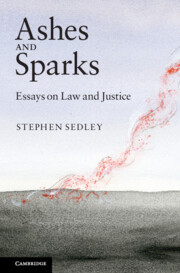Book contents
- Frontmatter
- Contents
- Preface
- Acknowledgements
- PART I History
- PART II Law
- PART III Justice
- 24 The right to know
- 25 The moral economy of judicial review
- 26 Policy and law
- 27 Responsibility and the law
- 28 The Crown in its own courts
- 29 Human rights – who needs them?
- 30 Fundamental values – but which?
- 31 Overcoming pragmatism
- 32 Sex, libels and video-surveillance
- 33 This beats me
- 34 Public inquiries: a cure or a disease?
- 35 Human rights: a twenty-first century agenda
- 36 Are human rights universal, and does it matter?
- 37 Bringing rights home: time to start a family?
- 38 The four wise monkeys visit the marketplace of ideas
- Index
29 - Human rights – who needs them?
Published online by Cambridge University Press: 05 June 2012
- Frontmatter
- Contents
- Preface
- Acknowledgements
- PART I History
- PART II Law
- PART III Justice
- 24 The right to know
- 25 The moral economy of judicial review
- 26 Policy and law
- 27 Responsibility and the law
- 28 The Crown in its own courts
- 29 Human rights – who needs them?
- 30 Fundamental values – but which?
- 31 Overcoming pragmatism
- 32 Sex, libels and video-surveillance
- 33 This beats me
- 34 Public inquiries: a cure or a disease?
- 35 Human rights: a twenty-first century agenda
- 36 Are human rights universal, and does it matter?
- 37 Bringing rights home: time to start a family?
- 38 The four wise monkeys visit the marketplace of ideas
- Index
Summary
This essay was written for the London Review of Books in 1992 while I was at the Bar. When, later that year, I was offered a seat on the bench, it was on the clear understanding that, while there was no reason (now that the Kilmuir Rules had been abandoned) why I should not continue to write and lecture on legal topics, party political issues were off limits; and so it has been.
In 1992 I viewed with scepticism not only the idea of incorporating the European Convention on Human Rights into the law of the United Kingdom but the desirability of a Bill of Rights of any kind. The scepticism is reflected in this discussion of a batch of publications urging constitutional reform. I acknowledge that history has overtaken me and that much – not all – of my scepticism was unjustified. This essay nevertheless forms part of an argument which is not yet over.
It has taken twelve years of Thatcherism to disrupt the complacency of the British about their civil liberties and their constitution. Our constitutional arrangements have never been much more than a matter of convention, and what passes for constitutional law has generally been a Panglossian description of the way things are. Our liberties are largely the product of a carry-over into the statism of the nineteenth and twentieth centuries of procedures (notably jury trial) and rights (notably the integrity of person and property) created in an earlier period by a judiciary concerned to consolidate the transfer of power from monarch to entrepreneur.
- Type
- Chapter
- Information
- Ashes and SparksEssays On Law and Justice, pp. 285 - 294Publisher: Cambridge University PressPrint publication year: 2011



